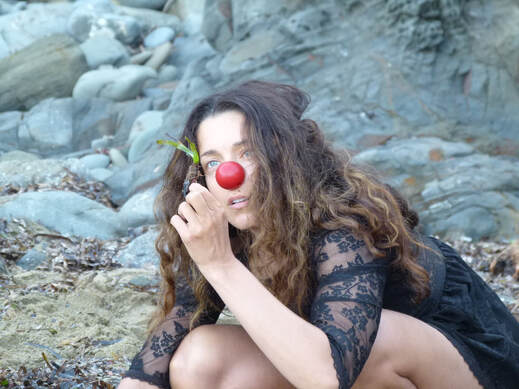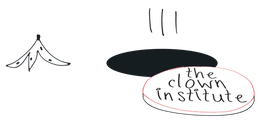Books
FilmsTVVideosSchoolsOrganisations
"There are three masks: the one we think we are, the one we really are, and the one we have in common." — Jacques Lecoq
The pedagogy of Jacques Lecoq has been the most influential and inspiring source for my teaching practice. As actors and creators, our goal is to develop a language that can evoke emotions, provoke thoughts, and create performances that truly touch people. This language should be both articulate and poetic, enabling us to express concepts that are imaginatively extraordinary. Surprisingly, some of these concepts may not initially seem dramatic, theatrical, or hilarious because they are often present in our everyday lives, and we have grown accustomed to them. For instance, the poetry lies in observing the people in a waiting room or the actions that make up our morning or nighttime rituals. It's about recognizing the ideas surrounding space, rhythm, and time. The core principle of Lecoq's pedagogy is to start by opening our eyes and truly observing. When Lecoq referred to the poetic, he meant those aspects of life that cannot be easily defined, that surpass words, and yet bring us together in a profound way. Once upon a time, humanity lived in close connection with nature and its phenomena. Some of these phenomena were awe-inspiring and even terrifying, such as earthquakes, fires, and plagues. To cope with these intense fears, humanity turned to adoration and the sacred. They believed that everything on Earth possessed a soul, whether it be rocks, trees, or animals. There was a desire to physically represent and communicate with the divine and the incomprehensible. This need to make the invisible visible and share it with a community and an audience led to the embodiment of these representations using materials like clay, wood, and rock. Ultimately, they used their own bodies to bring forth the divine. In this context, the Lecoq pedagogy takes us from observing the world to observing the impact we have on the world. This is where the clown enters the stage. Clowns are like empty vessels waiting to be filled and seen. They absorb the world around them and, by embracing life, they become charged and overflowing. Clowns have a deep desire to imitate life, not in a mocking way, but with genuine curiosity and joy. For instance, they might observe a priest giving a sermon and think, "Oh! That looks like fun! I can do that too!" Observation is fundamental in clowning. Just take a moment to watch some of Jacques Tati's films (which I eventually did after much persuasion from our teachers in Paris). They are incredibly funny and remarkably precise. Try it yourself—practice observing and finding amusement in the simplest and most ordinary things and people. What catches your curiosity? Study how a pigeon walks, and you'll be amazed at the discoveries. But what does it truly mean to observe something? As performers and creators, it is liberating when we realize the power of observation as a tool. We unconsciously observe things all day, every day, but when we become conscious of our observations, we learn the value of letting go of preconceived judgments, personal stories, and attachments. We can then purely observe the physical poetry inherent in something. My main question throughout this research is whether clowns can create a logical sequence by observing and imitating a phenomenon. Where might this playful approach take us? What stories, gestures, emotions, and relationships would emerge for an audience or within a duo or trio? There are moments in life when words fall short, and we turn to symbols and imagery to convey our stories. We use gestures, sounds, or colors to create "le jeu"—play. During a clowning and body workshop I conducted last year, we explored this clownlogic, and a participant exemplified its essence beautifully. They were asked to observe something from the outside world and then convey their findings through improvisation. Initially, the student represented a caricature or a character with their own opinions. However, when I encouraged them to delve deeper and search for the truth, their physical portrayal evoked laughter from the other participants. They had observed a person driving a car and, in their truthful portrayal, we all recognized the universal moment of boredom and waiting that we experience ourselves. The shared laughter affirmed the power of authenticity in connecting with an audience. Another participant observed a puddle on a rainy day. At first, they tried to convey the puddle's narrative with their own reflections layered into it. However, when they simply became the puddle and searched for its truthful essence, a poetic tragedy unfolded before our eyes. We all experienced a profound reaction to this glimpse of our own reflection. It was far more satisfying for the audience when the actor allowed room for us to breathe, dream, and imagine. Who would have thought a clown could be a puddle? It was both beautiful and tragic when someone stepped into it. Furthermore, we explored finding the voice of the clown. One participant observed a pigeon and, in organizing their body accordingly, they discovered a truthful dynamic. As the organs shifted inside, their voice changed, and their gaze transformed. We witnessed a touch of madness, a "follie," that could potentially become the starting point for a clown persona. Lastly, a student observed an umbrella. They focused on the specific qualities such as color and material, distinguishing between plastic and steel. They found the essence of the closed umbrella and then, with a pop, opened themselves up. In that precise moment, they uttered the phrase "that's a bit rough." It provoked laughter, showcasing the power of embodying the physicality first. When we work diligently with our bodies, the necessary text naturally emerges. This exploration is about play and imagination, envisioning and embodying the circumstances in a universally poetic sense. It doesn't require delving into psychological headspaces or relying on emotional recall from past painful memories. It remains grounded in the truth—the dynamic quality of a phenomenon. Transposing or playing with the truth can be far more satisfying than relying on ideas, parody, or personal memories. This has been my experience, and it was evident in the reactions of the audience as well. Regardless of where we find ourselves in the world, I hope that through this playful transposition of dynamics in the body, I can witness the emergence of clowns and unique poetic worlds filled with both hope and disaster. |
AuthorAlicia Gonzalez is a clown and coach living the beautifool life. Archives
July 2024
Categories
All
|

 RSS Feed
RSS Feed
